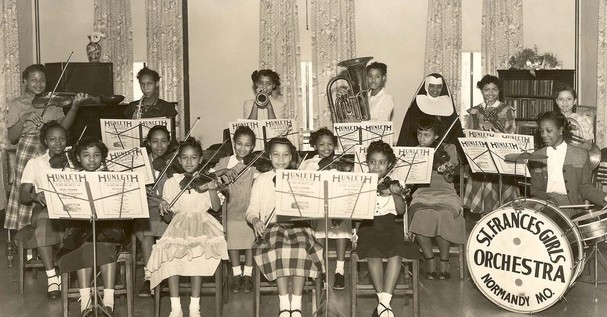Quiet Revolution: New Research Spotlights Role of Black Catholic Nuns in Desegregation

Photos courtesy Oblate Sisters of Providence Archives, Baltimore, Md. – The St. Frances Home for Girls in Normandy, Mo., near St. Louis, was founded by the Oblate Sisters of Providence, an African–American order providing black girls with elementary education and domestic training.
Long before the civil rights movement broke racial barriers to public education, black Catholic sisters were quietly desegregating Catholic colleges, universities and normal schools. Through a variety of strategies, black teaching nuns won admittance, opening doors not only to higher education for African-Americans, but also helping turn Catholic elementary and secondary schools into havens of quality education for black children, especially in the South.
It’s a largely untold story. But now a Memphis native, in work that has caught the attention of prestigious historical societies and universities, is bringing it to light.
Shannen Williams, 28, is a doctoral candidate at Rutgers University and a graduate of Craigmont High School here. She and others believe that, when finished, her dissertation, “Subversive Habits: Black Nuns and the Struggle to Desegregate Catholic America after World War I,” will be the first significant historical study of African–American Catholic sisters in the 20th century. It will also unearth, as she writes, “a forgotten battlefield of the African–American freedom struggle in which black nuns attempted to forge an alternative path to black liberation through Catholic education.”
Beginning in the 1920s, Catholic schools faced an accreditation crisis. States were demanding advanced training for private school teachers. The Catholic church operated the nation’s largest independent school system, including 144 schools for black children, nearly all in the South, said Williams.
The earliest of these black schools were founded by the black orders, and black nuns still made up a significant number of the schools‘ teachers and administrators, she said. Yet black sisters were excluded from Catholic higher education.
Williams’ exploration of their response and its wider ramifications is “potentially groundbreaking work,” according to the John Tracy Ellis Dissertation Award Committee, which last year named Williams winner of the award bestowed by the American Catholic Historical Association. The committee wrote that “it could shift our understanding … of the histories of race relations, the civil rights movement, education and American Catholicism.”
“I don’t think many have looked at black Catholics, period,” said Rutgers professor Deborah Gray White, the Board of Governors Professor of History at Rutgers University and a specialist in American history. “There’s not a lot of them. Also, we have focused on desegregation of public education and not so much parochial schools.” She called Williams “very, very smart … one of our brightest students at Rutgers.”
Williams details how the sisters and their allies, a small cadre of church prelates and priests, university administrators and some orders of white teaching nuns, employed often-surreptitious strategies.
The Sisters of the Holy Family, for example, desegregated what is now Loyola University-New Orleans in 1921, by taking classes that were taught off campus by the Sisters of Charity of Seton-Hill, a white order, but with credits granted through Loyola.
The Oblate Sisters of Providence worked secretly in 1933 with the archbishop of Baltimore to re-integrate the Catholic University of America, which banned American-born blacks during World War I. After three sisters were admitted to summer classes, two sisters became full-fledged students in the fall with the agreement that, if they did well, other black students would be admitted. Their academic excellence broke the ban.
Black sisters continued to integrate Catholic higher education through the 1950s, said Williams, but the church kept it under the radar.
“Catholics themselves were a minority and discriminated against,” said Williams. “To take on the African–American cause was risky if they hoped to assimilate into U.S. society.”
Williams, who is African–American and Catholic, spent four years researching her dissertation, including searching convent archives of the Oblate Sisters in Baltimore for six months and Sisters of the Holy Family in New Orleans for two months. She also lived for a week with the Sisters of Charity of Seton-Hill in Greensburg, Pa., as their guest. She was given her own room, took meals with them and prayed with them. “I was more quiet than usual, not wanting to disturb them,” she said. One nun finally told her to “loosen up.”
Williams notes that the black sisters, earning scores of certificates and degrees, kept the vast majority of their schools open and accredited. Those and future black Catholic schools — by 1960 there would be 349 with an attendance of 92,000 pupils — would become educational sanctuaries for African–American youth, who might otherwise have faced grossly underfunded public schooling or none at all.
Additionally, a significant portion of the first generation of African–American priests were former pupils of the black sisters. The nuns’ success along with the steadily increasing number of black priests, pressure from the Vatican, and other forces during and after World War II, brought mounting pressure that would eventually lead to the elimination of racial barriers in the U.S. Catholic church.
Williams said she was led to her subject by a newspaper story on the 1968 founding of the National Black Sisters’ Conference, an organization that fought to keep inner-city Catholic education alive during the era of white flight and suburbanization. But the organization’s founder convinced her the real story of black nuns’ educational activism began much earlier.
Among those Williams interviewed for her dissertation were African-Americans J. Terry Steib, bishop of the Diocese of Memphis, and Sister Donna Banfield, a former Jubilee Schools principal here from 2006 to 2010 who now serves in Philadelphia. Banfield, also a former Black Sisters’ Conference president, said bringing Catholic education to the poor and minorities in urban areas was a mission of her order, the Sisters of the Blessed Sacrament, as well as the conference.
“It can change the direction of a family tree if a child is able to get a good solid education. It makes a difference for the family as well as society,” she said. She called the concept of the Jubilee Schools “a new paradigm,” in Catholic schools. “It worked in Memphis because of Bishop Steib,” his vision and support, she said. Seven of the eight inner-city Jubilee Schools were once-shuttered Catholic schools, and now they serve more than 1,400 mostly non-Catholic and poor students.
Williams presented papers on her subject to the American Historical Association in Boston, the Organization of American Historians in New York, and, in March, the American Studies Conference at Heidelberg University in Germany.
In April, Williams was named one of 21 Newcombe Fellows by the Woodrow Wilson National Fellowship Foundation. The $25,000 fellowship is one of the country’s largest and most prestigious awards for PhD candidates in the humanities and social sciences.
The fellowship will allow Williams to spend a year finishing her dissertation, which she will do at the home of her parents, U.D. Williams Jr. and Vidonia Williams of Raleigh.
Williams said her interview with Steib was a turning point for her personally. He spoke of “bright flight,” she said: educated and talented young people leaving this city. It made her realize, “My heart is in Memphis,” she said. She plans eventually to teach on the college level and hopes that opportunity will arise here.
Meanwhile, she has a job to finish. “The nuns have made a contribution that remains invisible to us in regard to the struggle for racial equality,” she said. “I feel blessed to have this opportunity to tell their story.”




![Vice Presidential Debate 2012: Vice President @JoeBiden Vs @PaulRyan [Full Video]](http://iamnotarapperispit.com/wp-content/uploads/0587-480x317.jpg)
